Law
Ill-Treating Prawns
We've previously posted about a British case involving cruelty to goldfish. Here the British courts took up the question of whether it's possible to be cruel to prawns (aka shrimp), but dropped the case when it decided that prawns were insects and so not covered by anti-cruelty laws. They're actually crustaceans, but close enough I guess.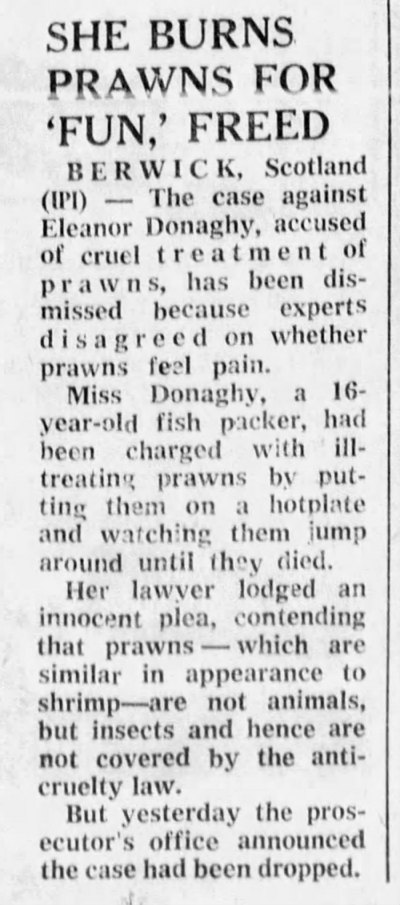
Feb 28, 1974 - Minneapolis Star
Posted By: Alex - Mon Sep 25, 2023 -
Comments (2)
Category: Insects and Spiders, Law, Sadism, Cruelty, Punishment, and Torture, United Kingdom
Biggest gratuity ever?
In 1941, when Dolores Moran was 15, she worked as a waitress at a drive-in restaurant in San Jose, California. One day she served a local farmer some coffee and hamburger. The next year Moran left San Jose and moved to Hollywood where she achieved brief fame as an actress.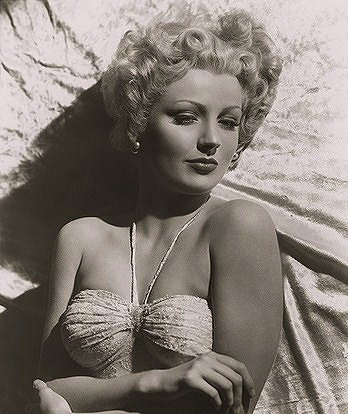
Dolores Moran. Image source: wikipedia
By the 1960s her acting career had ended. But then, in 1968, Moran learned that the farmer she had served at the drive-in 27 years ago had died, leaving her his apricot orchard valued at around $300,000 (or $2.5 million in today's money).
Moran had no memory of serving the farmer, whose name was Anthony Ponce. Nor had the two ever communicated since then. She said, "for the life of me I can't remember the man." But evidently she had made a big impression on him.
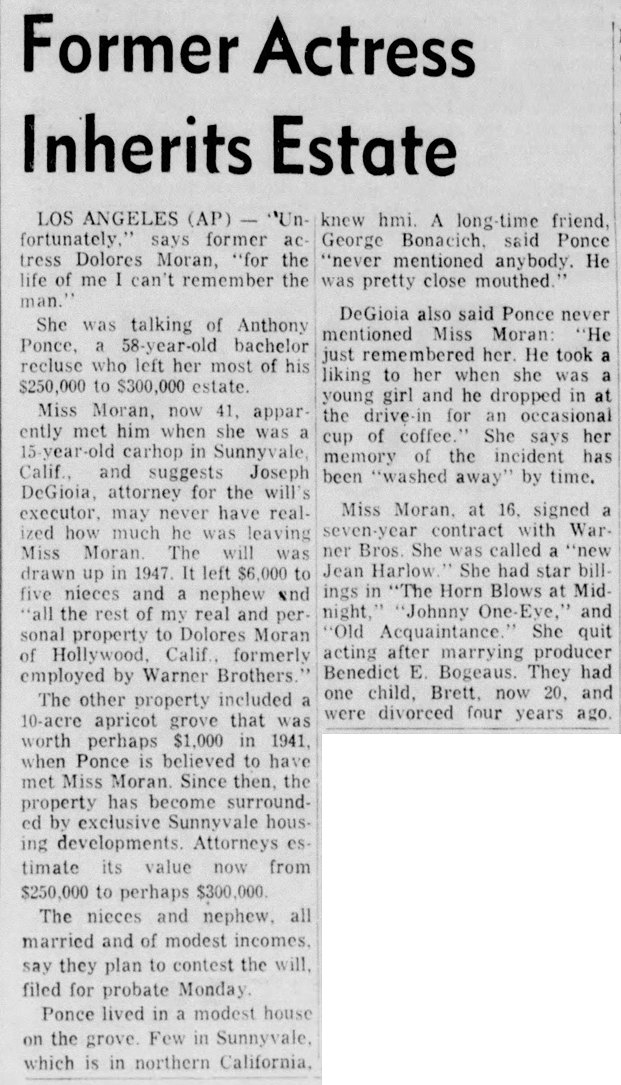
Monroe News Star - Dec 18, 1968
Ponce's relatives contested the will, arguing that he was not of sound mind when he made it. I haven't been able to find out how the case was settled, but I'm guessing Moran got to keep the orchard since it's usually fairly difficult to invalidate a will.
If she did get to keep it, then that would have to count as one of the biggest gratuities of all time. Perhaps the biggest? Especially for an order of coffee and hamburger.
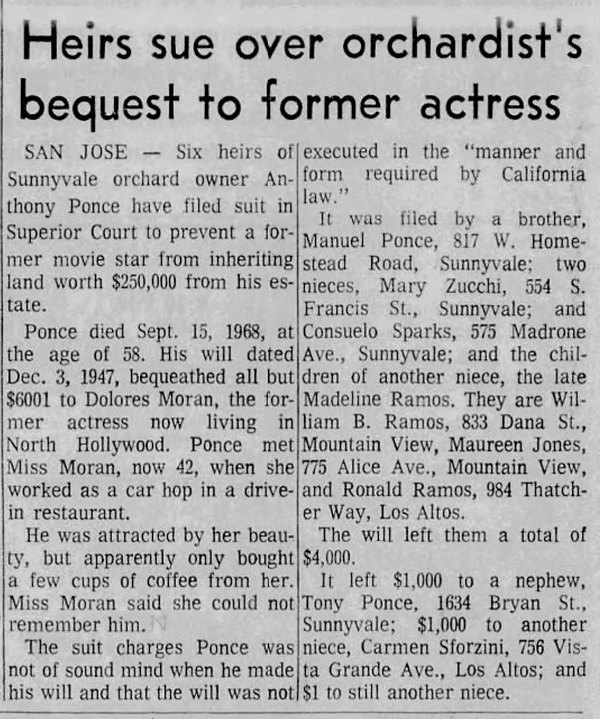
Peninsula Times Tribune - Feb 19, 1969
Posted By: Alex - Thu Apr 06, 2023 -
Comments (3)
Category: Death, Inheritance and Wills, Law, Restaurants, Actors
The right to wear a bikini while mowing the lawn
May 1966: The charges of indecent exposure, brought against 21-year-old Mary Lou Hood for mowing her lawn while wearing a bikini, were all dropped. The judge determined there was insufficient evidence of lewdness or indecent exposure to support the charges.The case was said to be the hottest issue in the college town of Edmond, Ohlahoma "since canned beer." The judge delivered his decision to a standing-room-only crowd. The case also received widespread national media coverage even though, as Hood's lawyer noted, the case didn't actually establish a legal precedent for a right to wear a bikini while mowing the lawn.
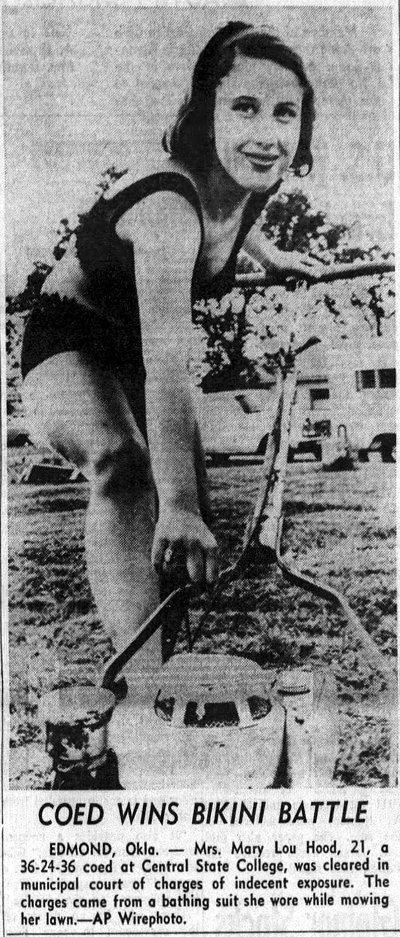
Muncie Evening Press - May 20, 1966
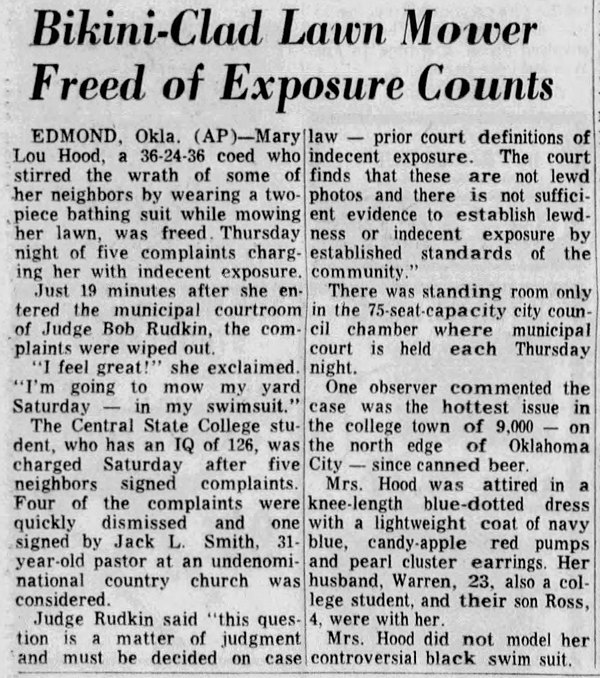
Spokesman Review - May 20, 1966
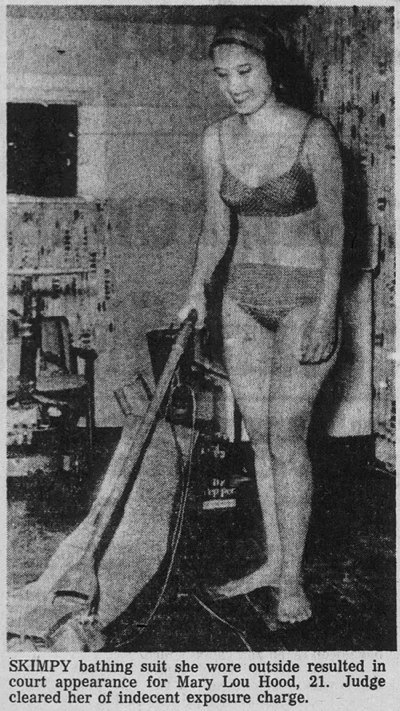
Ogden Standard Examiner - May 20, 1966
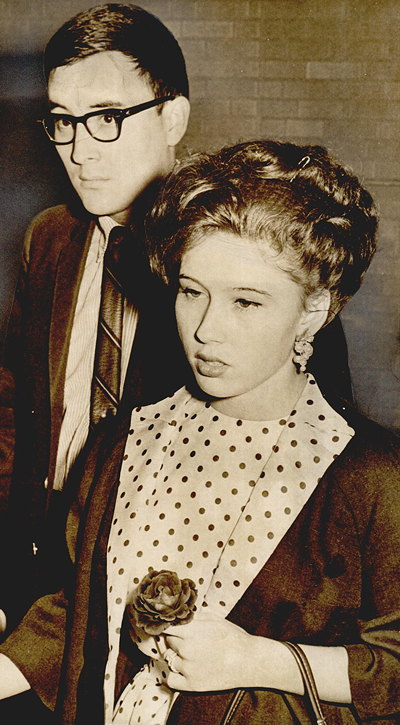
Mary Lou Hood, with her husband, at the courthouse
May 20, 1966. Source.
Posted By: Alex - Tue Nov 01, 2022 -
Comments (9)
Category: Fashion, Law, 1960s
No makeup or men for five years
When British dentist Philip Grundy died in 1974, he left the bulk of his estate, slightly over $400,000, to Amelia Whaite, the receptionist at his practice. But with some unusual conditions. He forbid her from wearing lipstick or makeup, or going out with any men, for five years.$400,000 in 1974, adjusted for inflation, would be over $2,000,000 today. So a nice chunk of money.
However, Grunday also made Whaite the sole executor of his estate "with the responsibility to see the will's conditions are kept." So if she didn't follow the conditions was she supposed to self-report herself?
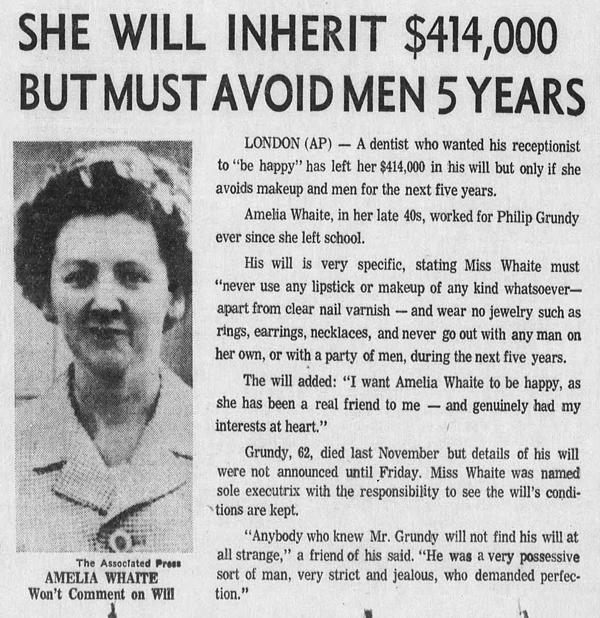
Atlanta Constitution - Mar 17, 1974
I found a forum where residents of Leyland, Lancashire (where Grundy worked) recalled going to his practice. Seems that, in addition to the money, he left behind a lot of traumatized patients. Some typical comments:
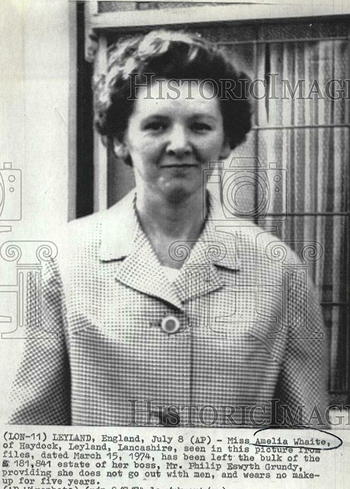
Some more info about Grundy and Whaite from a 1974 Associated Press article:
Four years later, Grundy was accused of addiction to inhaling anesthetic gas and was forbidden to practice for five years.
He resumed his practice in 1971 and built it into a flourishing enterprise with a staff of 14. . .
Miss Whaite now runs the practice, still with a 14-member staff.
Grundy sounds like he was a real piece of work.
Posted By: Alex - Wed Aug 31, 2022 -
Comments (5)
Category: Law, 1970s, Teeth
America Never Took Water
Sing along to this rousing anti-Prohibition ditty! Full lyrics here.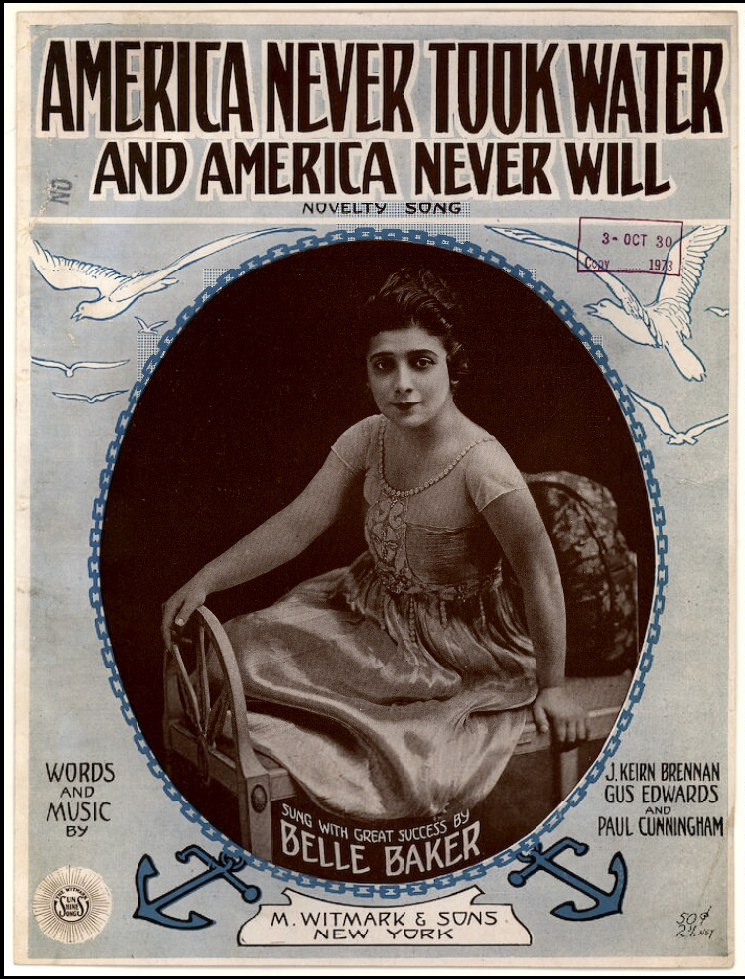
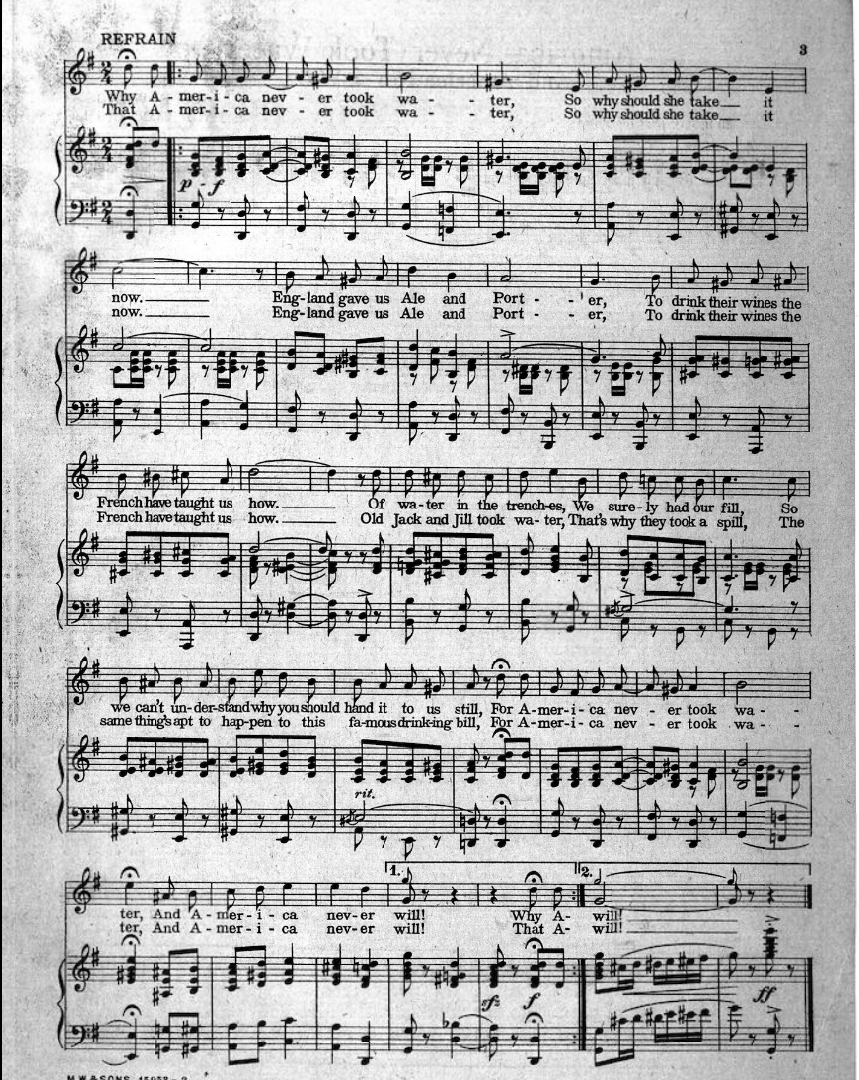
Posted By: Paul - Sat Jul 23, 2022 -
Comments (0)
Category: Government, Law, Music, Propaganda, Thought Control and Brainwashing, Alcohol
The Strange Will of John Mostow
Source: The Boston Globe (Boston, Massachusetts)04 Apr 1928, Wed Page 16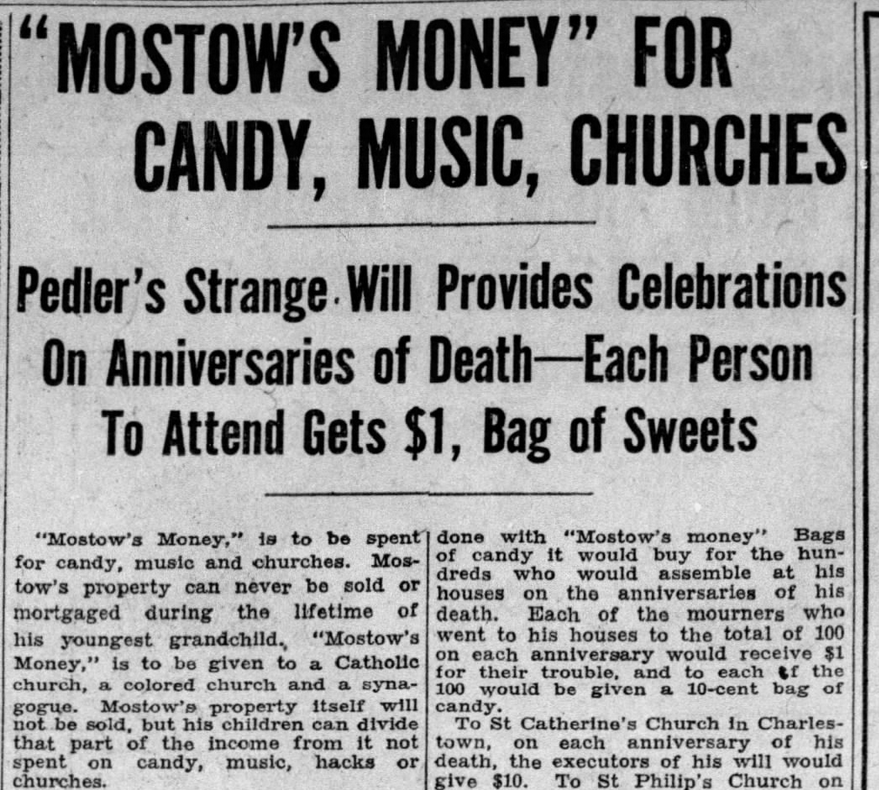
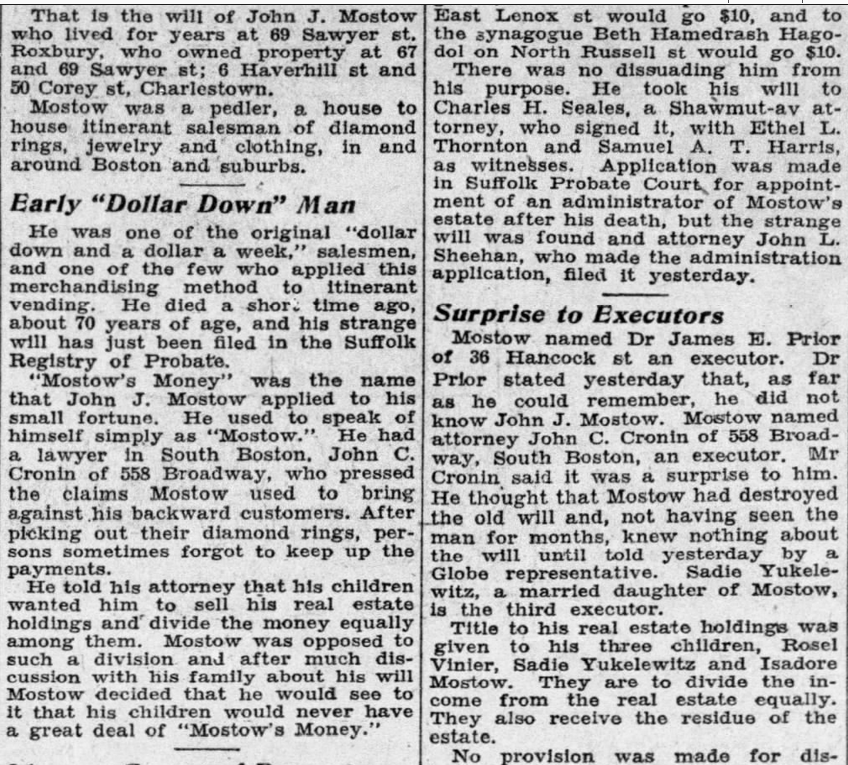

Posted By: Paul - Wed Jul 06, 2022 -
Comments (1)
Category: Death, Inheritance and Wills, Eccentrics, Law, Money, Candy, 1920s
Singing Jurors
Two different legal cases offer guidance on when singing jurors are considered grounds for a new trial, and when they're not. Details from the Virginia Law Register - April 1905.WHEN THEY'RE NOT:
From the case Collier v. State
WHEN THEY ARE:
From the case State v Demareste La
Posted By: Alex - Fri Apr 22, 2022 -
Comments (0)
Category: Law, Music
Understanding the Law: The Worm
Understanding the Law: The Worm, Diane Obomsawin, provided by the National Film Board of Canada
Posted By: Paul - Sun Feb 13, 2022 -
Comments (2)
Category: Law, Lawsuits, PSA’s, Cartoons, 1990s
Judge’s wife serves as juror in his court
This was legal???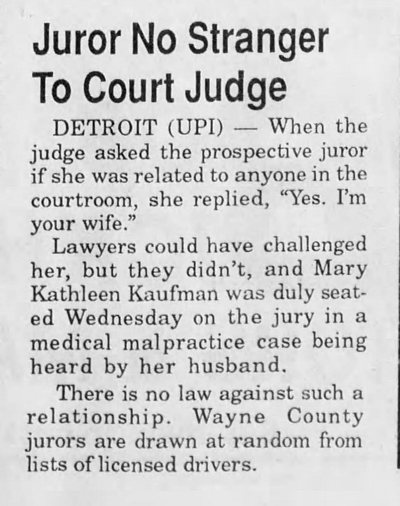
Macon Chronicle-Herald - Sep 8, 1989
Apparently so. Some googling reveals that this situation seems to happen fairly regularly.
Most recently, there was the case of Judge Thomas Ensor of Colorado whose wife served as a juror in his court. During the trial the judge repeatedly cracked jokes about the presence of his wife, such as, "Be nice to Juror 25. My dinner is on the line."
Inevitably the case was appealed, but in June 2020 the Colorado Supreme Court ruled that it was legal for Ensor's wife to be on the jury, noting that the defense lawyer could have objected to her sitting as a juror, but didn't. (Though the defense lawyer had said that he was afraid to challenge her.)
More info: ABA Journal
Posted By: Alex - Tue Jan 25, 2022 -
Comments (1)
Category: Law, Judges
The 1000-Mile Courtroom

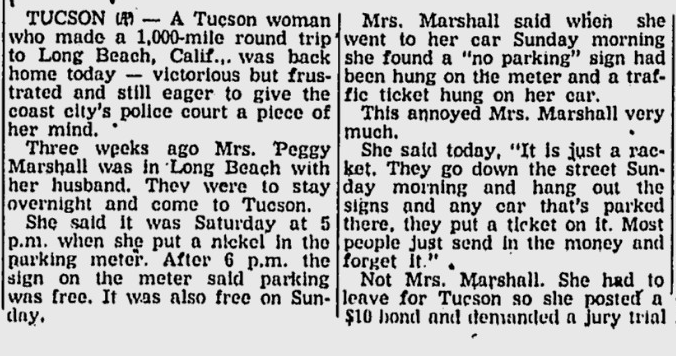
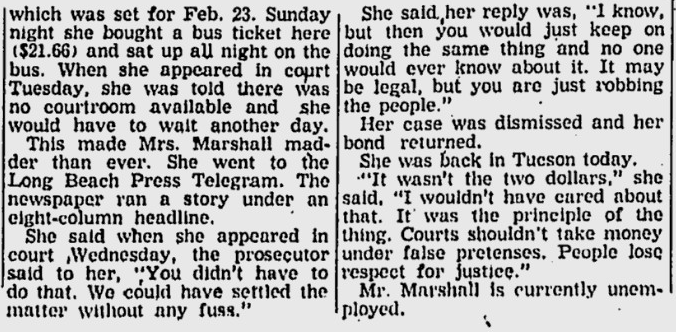
Source.
Posted By: Paul - Tue Jan 25, 2022 -
Comments (5)
Category: Eccentrics, Law, Money, Outrageous Excess, Police and Other Law Enforcement, 1950s, Cars

| Who We Are |
|---|
| Alex Boese Alex is the creator and curator of the Museum of Hoaxes. He's also the author of various weird, non-fiction, science-themed books such as Elephants on Acid and Psychedelic Apes. Paul Di Filippo Paul has been paid to put weird ideas into fictional form for over thirty years, in his career as a noted science fiction writer. He has recently begun blogging on many curious topics with three fellow writers at The Inferior 4+1. Contact Us |




